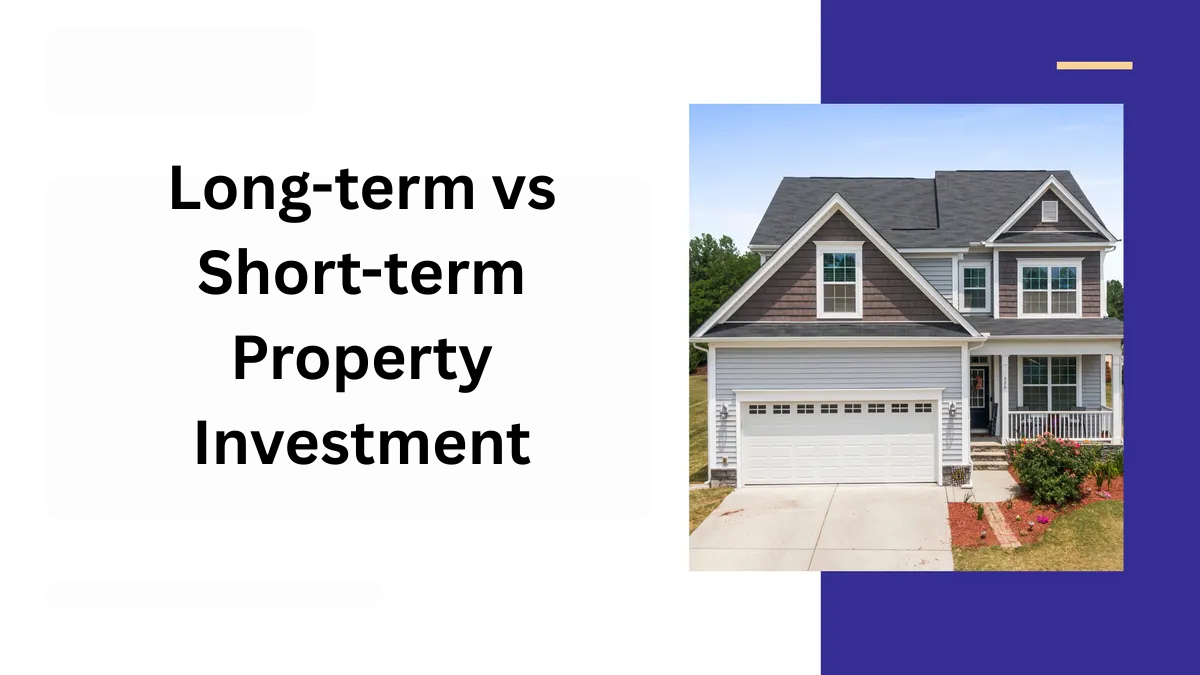Long-term vs Short-term Property Investment
Read latest blogs and articles from Housystan

The Information mentioned here was last updated on:
29/1/2026Long-Term vs Short-Term Property Investment:
Choosing between long-term and short-term property investment is one of the first and most important decisions an investor makes. It shapes how you earn income, how much time you invest in managing the property, and how your wealth grows over the years. Both strategies can be successful, but they work differently and appeal to different types of investors. Understanding their strengths and limitations can help you choose a path that fits your financial goals and lifestyle.
- Verified Tenants/Buyers
- Unlimited Property Listing
- Zero subscription/charges fee
Long-term property investment is often seen as the “slow and steady” approach. Investors buy a home or apartment and rent it out for years, sometimes decades. The appeal comes from stability. Knowing rent will arrive each month even if it isn’t a huge amount gives investors financial comfort. This consistency makes long-term investing popular among people who want predictable cash flow and a more hands-off style of earning.
Another reason long-term investing stays attractive is property appreciation. Over time, homes generally increase in value. This means that an investor who holds onto a property for many years can benefit not just from rental income but also from the property’s rising worth. It becomes a double gain: money coming in monthly and a home that’s slowly becoming more valuable.
For many investors, the reduced stress is another selling point. There’s no need to constantly find new guests, update listings, or handle frequent turnover. Once a reliable tenant is in place, the workload becomes much lighter.
The Appeal of Short-Term Property Investment
Short-term property investment is often described as the more energetic and fast-paced option. Think of vacation rentals, Airbnb homes, weekend getaways, or even properties that are bought, renovated, and sold within months. This approach attracts investors who enjoy maximizing their income in a shorter period and don’t mind a bit of extra work.
The biggest attraction is earning potential. Short-term rentals can bring in significantly higher returns during peak seasons. A beach home rented for a week in July may earn more than a month of long-term rent. Investors who own properties in high-demand areas tourist destinations, business hubs, or entertainment districts can benefit from this surge in income.
Short-term investment also offers flexibility. If you own a vacation home, you can block off dates for your personal use whenever you want. This adds a lifestyle benefit that long-term rentals simply cannot offer.
One major difference between these two strategies is how income flows.
Long-term investments offer predictable monthly income. Tenants sign leases, creating a sense of security for the investor. Even when the market slows or travel drops, long-term rentals typically remain occupied, giving investors confidence that money will continue to come in.
Short-term investments, however, are more unpredictable. Income depends on the time of year, local events, and even weather conditions. While the peaks can be impressive, the lows can be quiet. Investors need to be comfortable with these ups and downs and plan for months when bookings decline.
Your availability and personal lifestyle play a major role in choosing an investment type.
Long-term rentals require minimal involvement. Once a lease is signed, tasks usually include routine maintenance and occasional communication. Many long-term investors hire a property manager, allowing the investment to run smoothly without daily attention.
Short-term rentals demand far more involvement. Every new guest means more cleaning, more communication, and often more problem-solving. Reviews matter, so owners must keep everything in top shape and respond quickly to guest needs. The workload can be intense, which is why many investors choose management companies though this reduces profit.
Investors looking for passive income often favor long-term rentals, while those who enjoy hospitality or hands-on business are more drawn to short-term properties.
Long-term rentals have relatively predictable expenses, such as mortgage, taxes, insurance, and basic maintenance. These costs rarely fluctuate dramatically.
Short-term rentals come with a longer list of expenses. From frequent cleanings and restocking supplies to furniture upgrades and platform fees, the ongoing costs can add up quickly. Investors also need to budget for higher wear and tear because guests come and go much more frequently.
While short-term homes can earn more money overall, the costs of maintaining them can be noticeably higher.
Long-term rentals are generally less affected by sudden economic changes. People always need a place to live, regardless of travel trends or seasonal shifts. As a result, these properties typically remain occupied and stable through various market conditions.
Short-term rentals face more risk. Travel restrictions, new local laws, market changes, or dips in tourism can cut into earnings overnight. Investors need to be flexible and ready to adjust pricing or marketing when the situation changes.
This doesn’t mean short-term rentals are a poor choice they simply require a more adaptable mindset.
Lifestyle Freedom and Personal Use
Short-term rentals offer something that long-term ones cannot: the ability to use the property whenever you want. For investors who love the idea of owning a vacation home while still earning income, this flexibility is a major advantage.
With long-term rentals, the property becomes strictly a business asset. Once a tenant moves in, personal use is off the table for the duration of their lease.